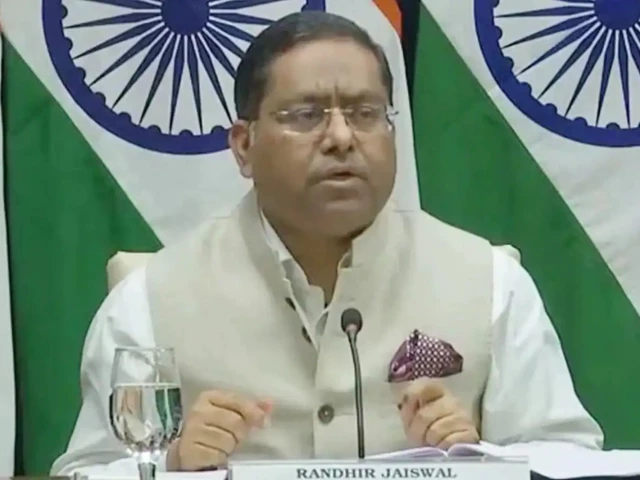India in denial, rejects Trump's claim of brokering ceasefire with Pakistan
The issue of trade did not come up,” says Indian FM spokesperson on recent talks between US and Indian leaders

When US President Donald Trump took the stage this week to declare that his administration had brokered a ceasefire between India and Pakistan, his remarks quickly triggered a diplomatic disconnect — especially after he credited trade incentives for securing the truce.
“Just days ago, my administration successfully brokered a historic ceasefire to stop the escalating violence between India and Pakistan,” he said, pausing for applause. “And I used trade to a large extent to do it. I said, ‘Fellas, c’mon. Let’s make a deal. Let’s not trade nuclear missiles — let’s trade the things that you make so beautifully.’”
To Trump, the story was simple: two nuclear-armed rivals, one American president, and a deal sealed with commerce, charisma, and the diplomatic equivalent of a wink. “They both have very powerful leaders, very strong leaders, good leaders, smart leaders,” he added. “It all stopped.”
For Washington, the ceasefire was a diplomatic win — one wrapped in campaign trail theatrics and Marco Rubio shoutouts. “Marco, stand up,” Trump said mid-speech. “What a great job you did on that. Maybe we can get them together for a nice dinner. Wouldn’t that be nice?”
But in India, the script read differently. No mention of Trump. No trade angle. No thanks. Instead, Indian officials reiterated that the ceasefire — which came after days of missile exchanges, drone strikes, and breathless TV coverage — was a direct, bilateral understanding with Pakistan. If the US played a role, India’s version suggests, it was merely peripheral.
And on Tuesday, New Delhi made that denial official.
At a weekly press conference, Indian foreign ministry spokesperson Randhir Jaiswal stated, “The issue of trade did not come up in any of these discussions,” referring to conversations between US Vice President JD Vance and Prime Minister Narendra Modi, and between Secretary of State Marco Rubio and Foreign Minister S Jaishankar.
Full comments by US President Donald Trump on India Pakistan understanding of 10 May
— Sidhant Sibal (@sidhant) May 13, 2025
"Let us not trade nuclear missiles, let us trade" goods
"India, Pakistan are getting along, & they can have a nice dinner 🍽️"
"Millions of people could have died due to the conflict" pic.twitter.com/9u0Ijx8dJb
Despite the disavowal, the ceasefire came just hours after Pakistan launched Operation Bunyan-un-Marsoos — a retaliatory campaign in which, according to Pakistani officials, five Indian fighter jets, including four Rafales, were downed. India has not specified what it lost during the clashes, merely acknowledging that “losses are part of combat,” while maintaining that it had the upper hand throughout the exchange.
Pakistan, by contrast, has offered effusive thanks to Trump, Rubio, and a long list of Gulf and Chinese allies. Prime Minister Shehbaz Sharif called it “a proactive and sincere effort” to prevent catastrophe.
India and Pakistan had been engaged in intense hostilities, including airstrikes and missile exchanges, after India struck targets in Pakistan it said were linked to militants responsible for the killing of 26 tourists in Kashmir, a claim which Pakistan categorically denied.
Trump said on Monday that he offered to help both nations with trade if they agreed to de-escalate military actions following a US-mediated ceasefire. He said, “If you stop it, we’ll do a trade. If you don’t stop it, we’re not going to do any trade.”
He had also offered mediation over the Kashmir dispute, which both nations claim in full but govern in part. India, however, rejected this offer, reiterating its longstanding position that issues related to Jammu and Kashmir should be resolved bilaterally with Pakistan. "There has been no change to the stated policy," Jaiswal said.
However, contrary to the Indian foreign ministry's claim, Trump said that just days ago, his administration had successfully brokered a historic ceasefire to stop escalating violence between India and Pakistan.
Speaking at an investment forum in Riyadh on Tuesday, he urged Pakistan and India to pursue trade with the United States instead of engaging in conflict. “And I used trade to a large extent to do it. I said, ‘Fellas, come on, let’s make a deal. Let’s do some trading. Let’s not trade nuclear missiles. Let’s trade the things that you make so beautifully,’” Trump said.




















COMMENTS
Comments are moderated and generally will be posted if they are on-topic and not abusive.
For more information, please see our Comments FAQ